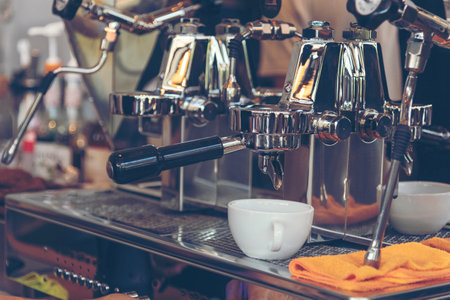Introduction: Brewing a Greener Future
Across the United Kingdom, coffee culture is thriving—whether it’s an artisan flat white from an independent café in Bristol or a quick Americano grabbed on the way to work in London. Yet, this passion for coffee has come with a significant environmental cost: single-use cups littering high streets and filling landfills. The urgency for sustainable solutions has never been greater. With mounting public awareness of plastic pollution and increasing governmental pressure to adopt greener practices, British consumers are rapidly shifting their expectations. Reusable cups have emerged not only as a practical answer but as a cultural movement reshaping the daily rituals of millions. Against this backdrop, innovative UK start-ups are seizing the opportunity to design the next generation of reusable cups—blending British ingenuity with eco-conscious values to transform how we enjoy our favourite brews.
2. British Start-Up Scene: Catalysts for Cup Innovation
The UK has long been a fertile ground for entrepreneurial spirit, and its start-up ecosystem is now leading the charge in sustainable design, particularly in the realm of reusable cups. Across England, Scotland, and Wales, a new generation of companies is reimagining the humble cup—combining form, function, and environmental stewardship to meet both consumer demand and regulatory pressures.
Emerging Innovators Shaping the Future
Several British start-ups stand out for their bold approaches to materials, user experience, and circular economy principles. These companies are not only addressing single-use plastic reduction but are also influencing global standards for reusable products. Below is a snapshot of notable UK-based pioneers:
| Company | Key Innovation | Location | Unique Value Proposition |
|---|---|---|---|
| CupClub | Smart tracking technology for cup return systems | London | Seamless integration with city infrastructure to facilitate mass adoption |
| rCUP (Now Circular&Co.) | Cups made from recycled single-use coffee cups | Cornwall | Pioneering closed-loop manufacturing and robust product longevity |
| Huskup | Biodegradable cups from rice husks | Bath | Natural material focus with vibrant British-inspired designs |
| Ecoffee Cup | Bamboo fibre composite construction | Llanelli, Wales | Lightweight, stylish alternatives with strong eco credentials |
| KeepCup UK | Customisable modular designs tailored to UK consumers | Bristol (UK Office) | Personalisation and barista-standard sizing for British café culture |
Nurturing Innovation Through Collaboration and Community Support
The rise of these ventures is bolstered by collaboration with local councils, universities, and sustainability accelerators. Many benefit from initiatives like Innovate UK grants or university incubator programmes, which provide technical guidance as well as access to test markets. This supportive landscape enables rapid prototyping and consumer feedback cycles—key ingredients in creating products that resonate across Britain’s diverse urban and rural communities.
A Distinctly British Approach to Design and Use Case Scenarios
What sets these start-ups apart is their sensitivity to British habits—be it the popularity of “takeaway tea” or the rise of artisan coffee shops in market towns. The next generation of reusable cups reflects this: ergonomic handles for commuters on double-decker buses, insulation suited for unpredictable weather, and sizes compatible with both national chains and independent cafés. As such, these companies are not just creating products—they’re fostering a cultural shift towards reuse that’s distinctly homegrown.

3. Design Meets Practicality: What Sets British Innovations Apart
British start-ups are at the forefront of redefining reusable cup design, expertly merging aesthetics, functionality, and environmental responsibility. Rather than simply replicating what’s already available, these innovators draw upon a rich legacy of British industrial design—where form always follows function, yet never at the expense of style. The result? Reusable cups that don’t just perform well in daily use but also resonate with the UK’s discerning, design-conscious consumers.
A Fusion of Aesthetics and Everyday Usability
One key differentiator is how British start-ups prioritise both visual appeal and real-world practicality. Many brands collaborate with local artists or reference iconic British patterns, giving their products a unique character that stands out on any high street. But it’s more than just looks: features such as one-handed open-and-close mechanisms, leak-proof lids, and barista-standard sizing make these cups genuinely convenient for the UK’s bustling café culture.
Engineering Sustainability into Every Detail
The focus on sustainability goes far beyond just material choice. Start-ups are increasingly utilising locally sourced materials like recycled stainless steel or plant-based bioplastics, ensuring a lower carbon footprint from production to delivery. Moreover, many British companies have adopted circular business models—offering repair services or take-back schemes to extend each cup’s lifespan, echoing the nation’s growing commitment to reducing single-use waste.
Market Leadership through Thoughtful Innovation
This holistic approach—combining striking British design with practical features and genuine eco-credentials—has allowed these start-ups to lead the market both domestically and abroad. By listening closely to consumer feedback and keeping pace with evolving sustainability standards, British innovators continue to set new benchmarks for what reusable cups can achieve in terms of user experience and environmental impact.
Navigating Challenges: Local Barriers and Consumer Behaviour
For British start-ups pioneering reusable cup innovations, the journey from concept to coffee shop is rarely straightforward. These entrepreneurs must navigate a landscape defined by ingrained consumer habits, logistical complexities, and a rapidly shifting regulatory environment. Understanding these hurdles is crucial for both industry insiders and eco-conscious consumers keen to support local ingenuity.
Changing Habits: The Human Factor
The UK’s deep-rooted coffee culture means that convenience often trumps sustainability. For many consumers, grabbing a disposable cup on the way to work is second nature. Persuading customers to remember, clean, and reuse their cups requires more than just clever marketing—it demands a cultural shift. Many start-ups invest heavily in educational campaigns and creative incentive schemes to nudge behaviour in a greener direction.
Legislative Landscapes: Navigating Policy Shifts
While recent government initiatives—such as plastic bans and the proposed latte levy—signal growing support for sustainability, the legislative environment remains a moving target. British innovators must constantly adapt to new requirements around materials, labelling, and hygiene standards. This can be particularly challenging for small businesses with limited resources.
Key Barriers Faced by British Reusable Cup Start-Ups
| Barrier | Description |
|---|---|
| Consumer Inertia | Reluctance to change established routines; low adoption rates for reusable options. |
| Regulatory Uncertainty | Frequent updates to rules governing food safety, packaging, and environmental impact. |
| Cost Pressures | Higher upfront costs for innovative materials and local manufacturing. |
| Logistics & Hygiene | Ensuring return-and-wash schemes are practical, safe, and widely accessible. |
Tackling the Challenges Ahead
Despite these hurdles, British start-ups remain undeterred. By collaborating with local councils, forging partnerships with major coffee chains, and leveraging digital platforms for customer engagement, they continue to drive meaningful progress. The road ahead may be complex, but these innovators are uniquely positioned to redefine Britain’s relationship with single-use cups—one brew at a time.
5. Collaboration Across Industries: Strengthening the Reusable Revolution
The momentum behind the reusable cup movement in Britain is not solely driven by innovation within start-ups; it is the result of dynamic collaborations that stretch across multiple sectors. Young British companies pioneering the next generation of reusable cups are actively forging partnerships with independent coffee shops, major high-street chains, and local authorities. This cross-industry synergy is crucial for scaling sustainable practices from niche to mainstream.
Uniting Start-Ups and Coffee Shops
Start-ups bring technical expertise and a fresh design perspective to the table, but their impact would be limited without integration into the daily rituals of British coffee culture. Collaborations with coffee shops—ranging from artisan roasters in Shoreditch to established names on Manchester’s high streets—facilitate real-world product testing, customer feedback loops, and visible adoption. Many cafés now offer incentives for customers who bring their own innovative reusable cups, helping shift behaviours while promoting homegrown brands.
Local Authorities: Catalysts for Change
Forward-thinking councils across the UK are recognising the environmental and economic benefits of supporting reusable initiatives. By working hand-in-hand with both start-ups and hospitality businesses, local authorities can pilot cup return schemes, provide grant funding for sustainable packaging solutions, and set city-wide targets for waste reduction. Initiatives such as Glasgow’s citywide reusable cup campaign or Bristol’s support for local circular economy projects exemplify how policy can accelerate adoption at scale.
Building a Circular Ecosystem
The most successful British start-ups don’t just sell products—they champion a systems-based approach. Through collaboration with logistics providers, cleaning services, and digital platform developers, they are building closed-loop systems that make reusing as convenient as single-use. These partnerships underpin pioneering projects where customers can borrow a cup at one location and return it at another, ensuring that convenience aligns seamlessly with sustainability.
Ultimately, it is this spirit of collaboration—rooted in British pragmatism and community values—that is driving the widespread acceptance of reusable cups. By breaking down silos between innovators, hospitality venues, and public bodies, the UK is laying robust foundations for a truly sustainable coffee culture, one refill at a time.
6. Looking Forward: The Future of Reusable Cups in Britain
As British start-ups continue to redefine the reusable cup landscape, the future is brimming with promise for both consumers and businesses keen to embrace sustainable change.
Forecasting Trends in the UK Market
The coming years are poised to witness a surge in demand for innovative, user-centric designs that seamlessly integrate into everyday British life. We anticipate a greater emphasis on locally-inspired aesthetics, smart technology integration (such as digital tracking or loyalty schemes), and partnerships with high-street coffee chains. As more consumers prioritise environmental responsibility, reusable cups are set to become not just practical tools but cultural symbols of conscious living across the UK.
The Role of Policy and Public Awareness
Legislation will likely play a pivotal role, with local councils and government bodies incentivising reusable cup adoption through levies on single-use alternatives and public campaigns. Educational initiatives will further cement the importance of waste reduction in schools, workplaces, and communities nationwide.
Long-Term Impact: Towards a Waste-Free Coffee Culture
If these trends continue, the cumulative effect could be transformative—drastically reducing landfill contributions and carbon footprints associated with disposable cups. By fostering collaboration between start-ups, established brands, and eco-conscious consumers, Britain is well-positioned to lead Europe’s shift towards a circular economy within its vibrant coffee culture. As we look ahead, it is clear that innovation at the grassroots level will remain key in propelling the nation towards a truly waste-free future—one reusable cup at a time.


